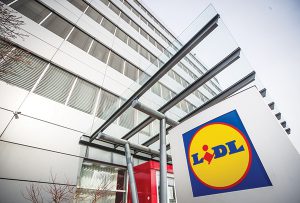UK food prices are rising at the fastest pace in more than a decade. Britain’s big four supermarkets are trying to pass on their own inflation by charging more. However, they must be careful not to sleepwalk into a crisis — as they did in the wake of the great recession, when they drove customers into the arms of the no-frills supermarkets Aldi and Lidl. That was a catastrophe for the mainstream grocery sector — and a boon for the German upstarts.
Monthly grocery price inflation reached 5.9% in April, the highest level since December 2011, according to data provider Kantar. As my Bloomberg News colleagues have reported, the combination of rising commodity prices, escalating labor costs and Brexit is raising fears that the era of cheap food is over.
The last time food prices rose significantly a decade ago, the so-called big four supermarkets — Tesco Plc,
J Sainsbury Plc, Asda Group Ltd and Wm Morrison Supermarkets Ltd — miscalculated badly. They raised prices across their stores, punctured by special offers funded by the big branded manufacturers.
In contrast, the UK branches of Aldi and Lidl offered permanent low prices. After arriving in Britain 10 years earlier, the discounters had honed their ranges, for example adding more fresh food and fancier wines to appeal to the cash strapped middle classes. The big four belatedly cut prices but they hemorrhaged billions of pounds of profit.
There are some indications that things will be different this time. The UK-based grocers have moved away from yo-yoing high prices and promotions, focusing on lower, more stable pricing. Some 21.5% of the shopping basket was purchased on promotion in the four weeks to April 23, compared with 35% in 2012, according to data provider NielsenIQ.
Both Tesco and Sainsbury match hundreds of their prices against Aldi. Tesco is also leveraging the power of its Clubcard loyalty program, confining its special offers to its more than 20 million members.
With their broader range of products and more spacious car parks, the big supermarkets can afford to be more expensive than the value chains — but not by much. Inflation in commodity prices is so severe that no one will be able to escape the pressure — even the discounters. However, if the differential expands, the big four risk an exodus of customers once more.
Already more shoppers are visiting Aldi and Lidl. Some of this is a recovery from the pandemic, when some Brits avoided smaller supermarkets with limited ranges. The two German companies are also continuing to open stores, while the big four are adding few new locations. But this is more than an unwinding of pandemic habits.
Some 41% of households shopped in Aldi in the four weeks to April 23, according to NielsenIQ, while 34% shopped at Lidl, indicating that more families are now using the chains for their weekly needs.
Aldi and Lidl were the only food retailers to enjoy year-on-year sales growth in the 12 weeks to April 17, according to Kantar. If the current trend continues, Aldi could overtake Morrison as Britain’s fourth-biggest supermarket within the next few years.
Even amid this pressure, Tesco looks best placed to weather the inflationary storm. It has been increasing its market share for more than a year, the first time this has happened for many years. The last time food prices jumped, Tesco had been investing heavily in its US business, giving it less leeway to cut what it was charging customers. Now, Tesco has pared back its international footprint and strengthened its balance sheet. As Britain’s biggest retailer, it also has the most clout with suppliers which should enable it to get the best deals.
Even so, Tesco needs to watch grumblings on social media about its special offers only being available to Clubcard customers, which could be a prelude to a backlash.
Morrison and Asda have both recently announced price-cut campaigns. Both were recently acquired by private equity groups and are free from the constraints of quarterly reporting. That should give them more room to maneuver.
But after Clayton Dubilier & Rice LLC’s £7 billion takeover last year, Morrison will be saddled with about £5.5 billion ($6.7 billion) of debt. It’s a similar picture at Asda, which was mostly acquired by billionaire brothers Mohsin and Zuber Issa and private equity group TDR Capital last year for £6.8 billion.
—Bloomberg
Andrea Felsted is a Bloomberg Opinion columnist covering consumer goods and the retail industry. Previously, she was a reporter for the Financial Times
 The Gulf Time Newspaper One of the finest business newspapers in the UAE brought to you by our professional writers and editors.
The Gulf Time Newspaper One of the finest business newspapers in the UAE brought to you by our professional writers and editors.

